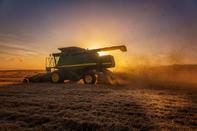So far, there has been a bias towards thinking that food security is only about production, so when policy makers think about how to address food insecurity, it is invariably the departments of agriculture or water affairs that get handed the issue.

And the conversation is usually in terms of how climate change will impact on growing conditions for plants, land reform policies or skills transfer to emerging farmers.
When a city designs its food security policy, it might well put all its resources into rolling out food gardens but might not pause to think about how school feeding schemes or the distribution of nutrient supplements in the form of sprinkles might be a far better way of spending the budget.
The fact that South Africa’s Integrated Food Security Strategy falls within the ambit of the Department of Agriculture, Forestry and Fisheries is telling, in terms of the government viewing food security as a matter of production and farming, rather than a broader and more cross-cutting issue.
Although the tendency to focus only on production is a skewed and incomplete view of the picture that is food security, it is still important to consider agriculture and food production. South Africa Online ® discusses the business of farming, covering topics such as the effects of weather and economic fluctuations on farms, the political climate for South African farmers and making sure enough food is produced to keep the nation fed.
By Leonie Joubert African soils are already nutrient-poor. Many studies have found that the nutrient load in certain fruits and vegetables has been on a stead...
African soils are already nutrient-poor. Many studies have found that the nutrient load in certain fruits and vegetables has been on a stead... It is the morning after another heavy rain. The last rivulets of water still trickle their way over the sodden earth and head for lower grou...
It is the morning after another heavy rain. The last rivulets of water still trickle their way over the sodden earth and head for lower grou... The agricultural sector is expected to be all things to all people. It has to prop up a nation’s or a region’s food security, and it is ...
The agricultural sector is expected to be all things to all people. It has to prop up a nation’s or a region’s food security, and it is ... Keeping commercial farmers in the business of growing food is key to a nation’s ability to feed itself. And in a world where inheritance i...
Keeping commercial farmers in the business of growing food is key to a nation’s ability to feed itself. And in a world where inheritance i... Standing beneath the clattering tin roof with the rain thrashing down and churning the dirt road outside to an ochre soup, farmer Jan Scheep...
Standing beneath the clattering tin roof with the rain thrashing down and churning the dirt road outside to an ochre soup, farmer Jan Scheep... Food, for the average poor household, is about survival. For people in the business of growing, processing and shipping food, it is a commod...
Food, for the average poor household, is about survival. For people in the business of growing, processing and shipping food, it is a commod... At 34, he has achieved what most farmers aim for in a lifetime. Between himself and his wife, Amelia, they have built up a small empire thro...
At 34, he has achieved what most farmers aim for in a lifetime. Between himself and his wife, Amelia, they have built up a small empire thro... Most of South Africa’s food goes through the hands of large-scale commercial interests. We have as few as 40 000 big farmers who account f...
Most of South Africa’s food goes through the hands of large-scale commercial interests. We have as few as 40 000 big farmers who account f... Farmer Jan Scheepers slides his notepad forward on the office table. Beneath the crest of arms printed in the top centre of the page and the...
Farmer Jan Scheepers slides his notepad forward on the office table. Beneath the crest of arms printed in the top centre of the page and the...